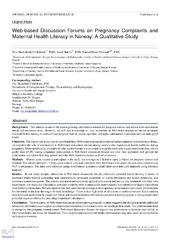Web-based discussion forums on pregnancy complaints and maternal health literacy in Norway: A qualitative study
Peer reviewed, Journal article
Published version

Åpne
Permanent lenke
https://hdl.handle.net/1956/12888Utgivelsesdato
2016-05-26Metadata
Vis full innførselSamlinger
Originalversjon
https://doi.org/10.2196/jmir.5270Sammendrag
Background: The Internet is one of the fastest growing information sources for pregnant women and seems to be used across social and economic strata. However, we still lack knowledge on how interaction in Web-based discussion forums influence maternal health literacy, in terms of how pregnant women access, appraise, and apply information to promote and maintain good health. Objective: The aim of this study was to understand how Web-based discussion forums influence maternal health literacy; hence, we explored the role of interactions in Web-based discussion forums among women who experienced health problems during pregnancy. More specifically, we explored why media-literate women experiencing the medically unexplained condition, pelvic girdle pain (PGP), during pregnancy participated in Web-based discussion forums and how they appraised and applied the information and advice that they gained from the Web-based interaction with other women. Methods: Women were invited to participate in the study via postings on 3 different open websites for pregnant women and mothers. The sample included 11 Norwegian women who participated in open Web-based discussion forums when experiencing PGP in pregnancy. The data were collected using synchronous qualitative email interviews and were analyzed using thematic analysis. Results:In our study sample, interaction in Web-based discussion forums influenced maternal health literacy in terms of increased health-related knowledge and competencies, increased awareness of health promotion and health protection, and increased system navigation. The women appraised and selectively applied information and advice that resonated with their own experiences. For many, the information provided online by other women in the same situation was valued more highly than advice from health professionals. Women reported that they used their knowledge and competency in encounters with health professionals but hesitated to disclose the origin of their knowledge. Those with a high level of education in medicine-related fields raised a concern about the Internet as a source of horror stories and erroneous information and were actively engaged in trying to minimize potential negative effects, by providing biomedical information. Conclusions: The popularity of Web-based discussion forums among pregnant women suggests that this group needs additional sources of information and support to complement traditional consultations with the health professionals. The professionals need to recognize that pregnant women access Web-based discussion forums for support and information to increase their ability to take better health decisions for themselves. This is a potential resource that health professionals may find useful in consultations with pregnant women.
